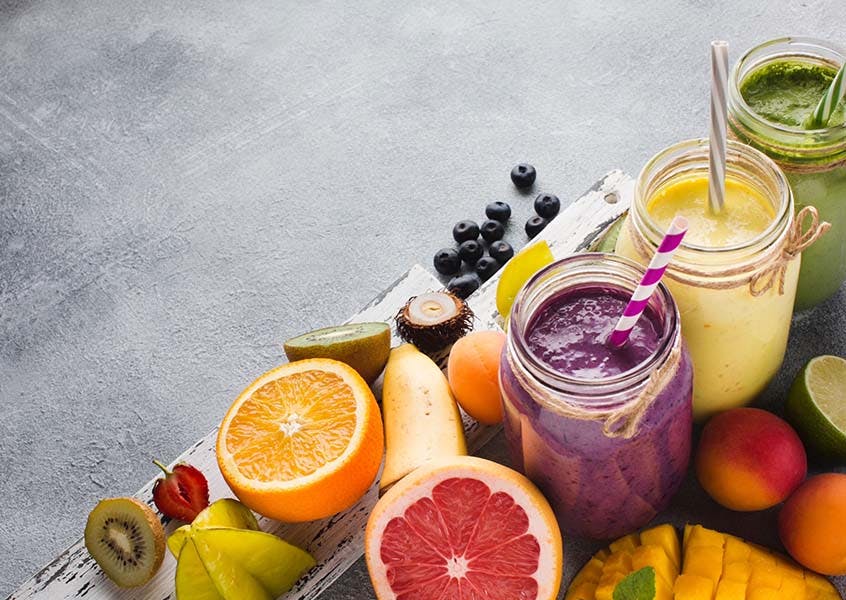Office workers often enjoy fruit smoothies as a refreshing beverage that is also beneficial for the body. However, excessive consumption of fruits with a sweet and delicious taste can have adverse effects. Therefore, it is important to explore the potential benefits and drawbacks of consuming fruit smoothies.
Benefits of fruit smoothie
Berries are the most commonly used fruits to make smoothies and are readily available in stores and supermarkets. These fruits are not only easy to find but also offer numerous health benefits for the body.
Cape Gooseberry is a rich source of vitamin C that can help prevent colds and allergies, as well as vitamin A, which supports eye health, prevents nyctalopia symptoms, and nourishes skin and hair.
• Cranberries are a good source of various vitamins and minerals, including vitamins C, E, and K1, manganese, and copper, all of which provide essential nutrients for the body. They also contain numerous biological compounds that act as antioxidants. Moreover, cranberries contain salicylic acid, a crucial ingredient in aspirin that can help relieve swelling, prevent blood clots, and combat cancer cells.
• Blackberries are high in vitamin C, which can help restore collagen and repair damaged tissues. They also contain vitamins A and E, which can slow down premature aging, nourish the skin, and promote wound healing. Additionally, blackberries are a rich source of vitamin K and other vitamins that support metabolism, dietary fiber that aids digestion, ellagic acid that reduces the risk of cancer, maintains female hormonal balance, and decreases the chance of miscarriage.
• Raspberries contain antioxidants that stimulate the immune system and are low in sugar, making them ideal for weight control. The red pigment in raspberries enhances blood circulation and lowers the risk of miscarriage. Raspberries also contain folic acid, which strengthens the embryo during pregnancy.
• Blueberries contain anthocyanin, a flavonoid that acts as an antioxidant and provides various health benefits. Research shows that consuming blueberries can lower the risk of obesity, diabetes, and heart disease. Moreover, blueberries are also known to promote healthy skin, nourish eyesight, improve bone density, reduce blood pressure, and prevent heart disease.
• Strawberries, although not part of the berry family, are rich in antioxidants such as quercetin, kaempferol, and anthocyanin, which inhibit various carcinogens. They are also a rich source of vitamin C, which boosts immunity, promotes collagen production for the skin, prevents colds, alleviates allergy symptoms, and reduces oral disease symptoms caused by vitamin C deficiency.
Harmful effects of fruit smoothies
Moderation is key when consuming fruit smoothies to avoid potential negative effects on the body. Daily consumption may lead to obesity or diabetes, especially when stores add excessive amounts of syrup, fresh milk, sweetened condensed milk, or other sweeteners to increase calorie and sugar levels. It's also important to be mindful of excessive consumption of certain fruits, as it may result in an intake of harmful substances. For example;
• Cranberries contain Salicylic Acid that can cause kidney stones.
• Mangoes are high in carbohydrates and sugar, which can lead to higher fat content and quick absorption into the bloodstream.
• Bananas, despite being rich in potassium and fiber, also have high calories and carbohydrates that can increase body fat.
• Avocados, although full of fiber, are also high in calories and can lead to weight gain when consumed excessively.
• Coconuts have a lot of coconut water but coconut meat is high in carbohydrates, which can increase body fat.
It's important to be mindful of the amount of fruit we consume in our smoothies. We can ask stores to skip adding milk and sugar, use whole or half fruits, and avoid extracting the fruit to maximize the benefits to our bodies. People with underlying health conditions should also be cautious when consuming fruit as excessive intake may exacerbate their condition. One example is a chronic kidney failure patient who experienced erratic and irregular heartbeat due to high potassium levels in the blood after drinking two glasses of smoothie juice. This highlights the potential harm that excessive fruit consumption can cause for those with physical imbalances.
However, if we control our fruit consumption properly, it can contribute to our overall health and well-being. It's important to have a good understanding of what we consume to optimize its benefits. For Krungthai-AXA Life Insurance customers interested in health care, you can check out other health articles at https://www.krungthai-axa.co.th/th/health-advisories.
References
· Paolo Hospital
http://bit.ly/3XuiudB
· Faculty of Medicine, Mahidol University
bit.ly/3D8CQkx


